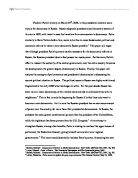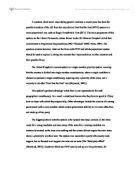This arouses another key component of the presidential model; it has set term times for its officials. For instance the President is in office for four years and can only be removed by being impeached by the congress, a very rare move. This gives the system a stability and removes the uncertainties of the parliamentary system where the threat of both the vote of confidence and anticipated elections always hang over the government. Anticipated elections though inducing a certain amount of uncertainty into the parliament, they also give the government a much greater flexibility then that of its American counterpart, enabling them to alter the political landscape of the parliament to react to the changing moods and reality of the domestic and international environment. New elections may be called before the obligatory five years for a number of reasons, for instance to strengthen a parties ruling majority, to introduce a new government if one cannot be created or becomes unworkable or to respond to crises such as a huge scandal in government.
In terms of elections in the Congress the framers ensured that both houses of the bicameral legislative should be elected, in keeping with the founding democratic principles of the American constitution. This leads to a much fairer and representative governing of the people as all aspects of the legislative and presidency are elected by the people. However the relatively high number of elections may go some way to explaining the extremely low voting turn out of the American people, perhaps somewhat apathetic to elections they dismiss as commonplace and thus irrelevant.
These dual Presidential and Congressional elections allow the opportunity for both a legislative and government division. If different parties occupy each house or the congress is united against the opposing administration there can be a divided government. This can lead to a deep division within the presidential system if the ‘two sides disagree, it can be very difficult to enact legislation or concur on appointments to the Supreme Court’, famously described by Rauch under the term of ‘demosclerosis’. However, ‘few examples of a unified government since WWII demonstrate that unification does not guarantee efficient, informed, timely and effective public policy’, as seen under Jimmy Carter’s administration and due to the individualist based nature of US politics rather then party orientated. In fact the potential delays associated with dual democratic legitimacy ensures that policies are not rushed and are mutual accepted by both the executive and legislature.
The third branch of the presidential system is the Supreme Court, yet Schubert has shown that it is only since 1957 has the supreme court began to exert its power over the congress and president by asserting its constitutional right to veto laws it deems unconstitutional. Previously to this the Supreme Court had only struck down President's actions fourteen times, failing to maintain an effective separation of power by undermining the system of balance and checks that the US model is based on. A more independent and aggressive judiciary helps to ensure that the constitutional rights of the public are preserved and to limit the powers of the executive and legislative. However there still remains the capacity for a combined, presidential, congressional and federal over turning of the Supreme Court ruling so as to ensure the balance of power remains.
Though the British parliament encompasses a number of similarities with the US’ model such as a bicameral legislative and three branched system, it still remains profoundly different in how these institutions are created and distributed. Most importantly only the legislative is democratically legitimate. This means that the executive originates from and is appointed by the legislative. This has a number of critical implications. Without the potential legitimacy conflicts that may occur in America the government can rule much more efficiently and quickly then the grid locked Presidential model. However the executive is prevented from abusing this power by the fact they have no democratic power base and as such, are accountable to the legislative by a vote of confidence. This allows a flexibility in the parliamentary system that America lacks. If the government suffers from ineptitude, an unworkable hung government or national crisis the government can be expelled and new elections called. This has only occurred once in Britain in 1979 when the minority government of Labour's Callaghan was removed with a vote of no confidence when the government had become hung and ineffective.
The UK also has an unelected head of state, albeit a de jure power role. Though this is extremely undemocratic when compared to the US system, monarchists argue that the royal family acts as a symbolic vessel for all the heritage and wisdom of the previous generations and is a fundamental institution of the British consciousness. The same can also be said for the lower house of the UK’s bicameral legislative. The house of Lords is another unelected part of the parliament, albeit much less influential then the house of parliament. This gives the parliament a stability, in its continuity that the permanently changing congress lacks, even if this is at the expense of democratic inclusiveness.
The house of Lords also acts as the highest judiciary court of the parliamentary system. They can repeal government decisions only by legal precedents as the UK has no constitution. This streamlines the political structure and thus reduces the opportunity for inter-branch conflict which would slow down and inhibit the mechanism of governing as demonstrated by the demosclerosis that occurs in the US. However this is an obvious merging of powers and allows room for the abuse of power and conflict of interests, and as such is a serious flaw in the UK system.
The traditional form that parliament or legislature takes is that of a majoriatarian, where there is one dominant party with a majority of seats (51 %plus). With Britain’s tradition of a minister’s loyalty to their party and the whip system, they have very disciplined parties compared to America. This allows the party with an absolute majority to pass their legislative quickly and efficiently. Whereas in the US, ‘despite the importance of party labels, member of Congress are independent players who vote not primarily out of party loyalty but to advance their constituency and career interests’. This means that the fluidic environment of Congress relies on undisciplined parties in order for it to function in a divided government, the existence of a whip system in such a divided government would produce comprehensive grid lock.
This is a final example of the inherent indigenous nature of politics, what works in one state may not work in another. This is evident in the wide spread failure of president democracies such as in South Vietnam. America’s attempts during the Cold War to remake the third world in its image have obviously been an over-riding disaster. Both these systems require a number of prerequisites in the nation they are being implemented in. America requires a lack of ideological rigidity, undisciplined parties and locally-orientated politics, whereas Britain needs public deference to its political rulers and an allegiance to authority. So despite each systems blatant imperfections they are ideally suited to the two entirely different nations they exist in.
Juan.J.Linz, ‘The global resurgence of Democracy’, John Hopkins University press, 1996 (page 187)
Michael.J.Sodaro, Comparative Politics: a Global introduction, McGraw Hill International Edition, 2001 (page 197)
Juan Linz and Arturo Valenzuela, eds, ‘The Failure of Presidential Democracy’ Johns Hopkins Press 1996 (page 164)
Arendt Liphart, ‘Parliamentary versus Presidential government’, Oxford Univeristy press 1992 (page 269)
Arendt Liphart, ‘Parliamentary versus Presidential government’, Oxford University press 1992 (page 299)
Michael.J.Sodaro, Comparative Politics: a Global introduction, McGraw Hill International Edition, 2001 (page 197)
James Pfiffner, ‘Understanding the Presidency’ Longman 2000 (page 255)
Juan Linz, ‘The Perils of Presidentialism’ in The Global Resurgence of Democracy’ 2nd ed, Larry Diamond and Marc F.Plattner eds. Johns Hopkins Press 1996








